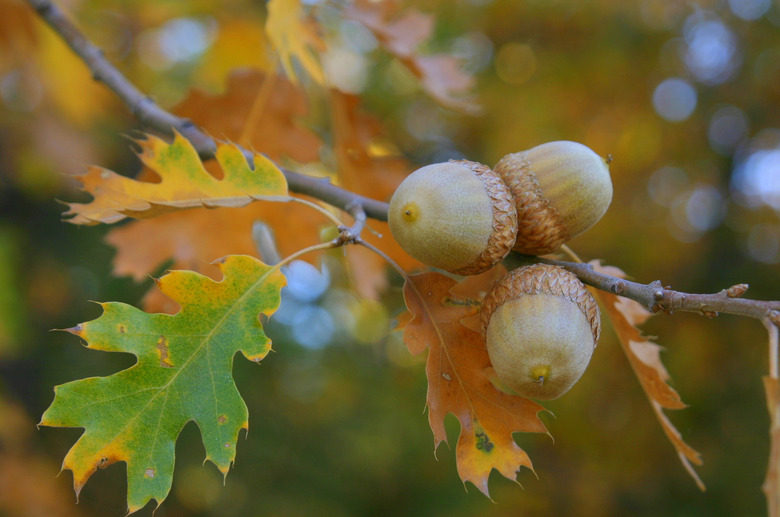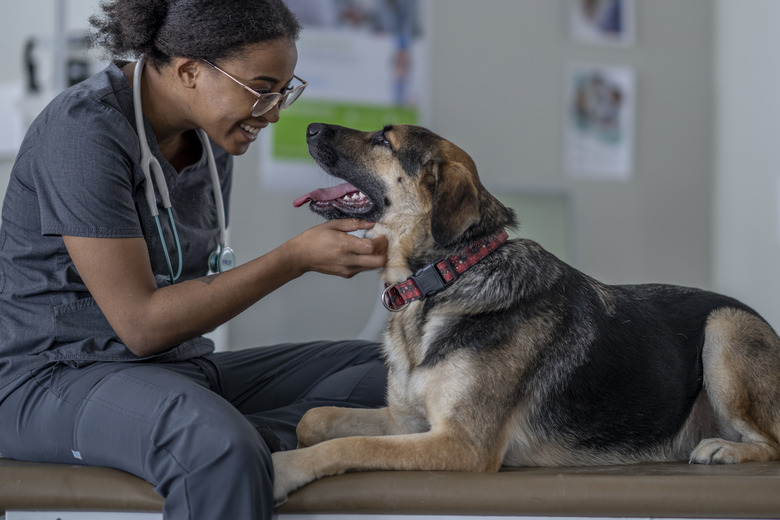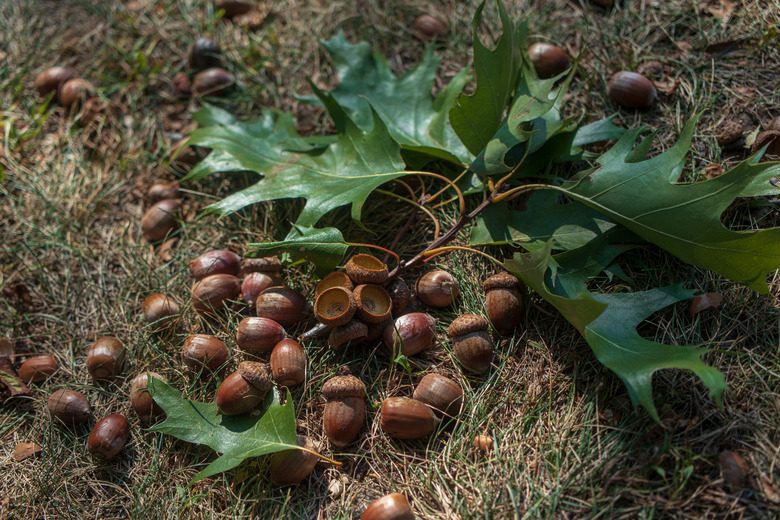Are Acorns Dangerous To Dogs?
Acorns are an aesthetically pleasing part of fall. Some people even enjoy using them as decor inside of a home. But, these nuts are very dangerous and toxic for dogs to consume. When you are out on fall walks, keep your dog away from acorns on the ground.
If you know that your dog tends to eat things — be alert and keep a close eye on them — especially with young puppies. If your dog does ingest an acorn, it can lead to serious illness for them.
Dogs can be poisoned by acorns
Dogs can be poisoned
by acorns
Although acorns look harmless, they can be very harmful to dogs. Oak trees have a high concentration of tannins — specifically in the leaves and acorns. Tannins can cause gastrointestinal distress if consumed by dogs. Tannin is a compound that is toxic to dogs. Dogs who eat acorns experience stomach upsets and need to be evaluated by a veterinarian.
Acorns can even lead to kidney disease in dogs — depending on how many are eaten. Dogs who eat acorns, (especially in large amounts) will likely be in gastrointestinal distress. They can also experience quercus poisoning because of the acorn's tannins. Quercus poisoning can also be caused by dogs eating oak leaves.
All acorns are bad for dogs. They all can lead to serious health issues for dogs. However, the not-yet-ripe green acorns have the highest levels of tannins of them all. Green acorns can cause the most severe acorn poisoning.
Acorns can cause kidney damage, liver damage, abdominal pain, and an upset stomach. In severe cases of acorn poisoning, dogs can even die.
Symptoms of acorn poisoning in dogs
Symptoms of acorn
poisoning in dogs
Acorns negatively impact a dog's digestive system if they are consumed. Symptoms to be aware of with acorn poisoning are diarrhea, retching, vomiting, abnormal drooling, stomach discomfort, and lethargy. If you have noticed your dog eating acorns, take your dog to the veterinarian immediately. Do not wait for symptoms to appear before getting your dog veterinary support.
Acorns can also cause organ blockages for dogs
Acorns can also cause organ blockages for dogs
Acorns are a choking hazard for canines. These nuts can lead to intestinal blockages. Whole acorns can become lodged in a dog's stomach or intestines leading to a gastrointestinal blockage. Blockages are not only uncomfortable, but they are also dangerous. Treatment for such blockages is often surgery. If left untreated, they can be very serious — and even fatal for dogs.
What you should do if your dog has eaten acorns
What you should do if your
dog has eaten acorns
If your dog eats acorns, (or you suspect it) it's important to get help right away. The best thing you can do is get your dog to a veterinarian for observation and treatment — immediately. Call your veterinarian or a local emergency veterinary clinic if the ingestion happens outside of regular clinic hours.
Veterinary treatments for dogs with acorn poisoning
Veterinary treatments for dogs with acorn poisoning
Your veterinarian or an emergency veterinarian may perform an X-ray. This will allow them to see how many acorns your dog has eaten, and how they are moving through your dog's body. An X-ray will help determine if surgery is needed to address a blockage or if the blockage could pass on its own.
Your veterinarian will likely also do bloodwork to check your dog's kidney function and other vitals. Treatment is going to be determined by your dog's symptoms but may include medication to address the gastrointestinal discomfort, as well as IV fluids.
Treatment for acorn ingestion and possible poisoning is going to depend on the size of your dog. It will also depend on how many acorns they have consumed. Smaller dogs only need to eat a few acorns in order to become sick due to their body weight. How sick a dog gets will be based on a variety of factors. This includes how many acorns they have eaten, their overall health, and their total body weight.
Prevent your dog from eating acorns
Prevent your dog
from eating acorns
The best way to prevent your dog from getting sick from acorns is to prevent them from eating them. Letting your dog sniff and explore on walks is a great source of enrichment. But, pay attention to what your dog is sniffing. If you know your dog has a tendency of putting things in their mouth, be sure to practice your dog's "drop it" cue. Practice the cue with your dog in advance, so you'll be ready to use it on your walks together. Then, be sure to have high-value training treats with you — to reward your dog for dropping the acorns!
If you have a lot of acorns near your home (and your dog has a history of eating things they should not), you may also want to consider muzzle training them to prevent your dog from getting sick from the acorns.
The bottom line
The bottom line
Although acorns are a festive part of autumn, these fall favorites are dangerous for dogs. Whenever possible, keep your dog away from acorns. Avoid using them as decor inside your home. Consumption of acorns can lead to gastrointestinal distress, poisoning and even death for dogs. If you see your dog eating acorns, contact your dog's veterinarian right away.


